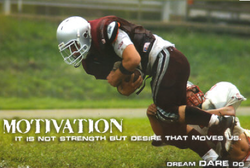
I have been reading a lot of Daniel Pink lately. First, I read Drive. Alan November interviewed Mike and I a few months back and he had mentioned this book after some comments we had made about motivation and creativity. I thought I should get it and start reading, although I was sure I was sold on the ideas before I broke the pages. Dan's main point in Drive, according to his twitter summary: "Carrots & Sticks are so last century. Drive says for 21st Century work, we need to upgrade to autonomy, mastery & purpose." (Pink/203).
I have always bought into this type of thinking. Motivation comes from within, not external threats or bribes. I found several really interesting quotes in this book, that I would like to share before we move on.
-"They're working hard and persisting through difficulties because of their internal desire to control their lives, learn about their world, and accomplish something that endures." (79) Do you see this in your classroom?
-"People to contribute rather then just show up and grind out their days." (100) -What teacher has not wanted this?
-"No matter what kind of business you're in, it's time to throw away the tardy slips, time clocks, and outdated industrial-age thinking." (101) -When was the last time you handed out a tardy slip? Why are they late anyways?
-"We're born to be players not pawns." (107) Directions: read pages ??? and answer these questions.
-"Control leads to compliance: autonomy leads to engagement...only engagement can produce mastery" (110-111) When was the last time you had true engagement and what caused this engagement?
-"Effort is one of the things that gives meaning to life. Effort means you care about something, that something is important to you and you are willing to work for it." (125) How often in your work room is the conservation about EFFORT?
-"Do the workers refer to the company (school) as "they"? Or do they describe it in terms of "we"?" (129) Do your students see school on their team?
Daniel Pink's book is straight forward, the world has changed and we still are using an outdated method of motivation that is not based in research and science.
So here we go. Schools motivation ideals are screwed up, according to Pink. They are based on the old idea that teachers are the masters of knowledge and if students will only open their mind to what we are saying they will be successful. That used to work for some. They would do well, go to college or take a job at Ford and live a happy life (Pink called this Motivation 2.0). However, the world has changed and a new version of motivation is needed (Motivation 3.0). I disagree with Pink here. The ideas of Motivation 3.0 are not new ideas, but they are hard to implement in today's schools and often overlooked. High Stake Tests, Common Core, RttT, and other devices simply dictate what we "have" to teach; without focusing on who we are teaching. We lose site of kids and only see numbers, data and value added (by the way that is education talk for teacher Motivation 2.0: merit pay). That encourages more Motivation 2.0. How do we move to more 3.0 motivation?
We need to address the three elements of Motivation 3.0 according to Pink. First, Student's need to gain autonomy, not empowerment (we love this word, it gives the impression that students have power in the system). Autonomy is self direction. Second, Mastery of the topic (big word in education ten years ago). And third, purpose (education likes to use meaning or relevance).
Can a classroom achieve these in today's world? I believe we can. But I also believe the system right now makes this very, very hard to do. Being creative and finding ways to use technology helps us provide autonomy, mastery and purpose to student work. We won't ignore standards (nor should we), but we can and will find ways to engage students in self directed and meaningful work.
The collaboration between Mike and I has made it possible for us both to create new and exciting ways to provide students with Motivation 3.0. No homework has helped, collaboration between the schools adds purpose and meaning and self-directed WebQuests/PBL's give students actual autonomy. But at times it becomes overwhelming. It is one thing to try and change the way students are motivated, learn and engage in the world, but it is a whole other task when you take into account 6 previous years of being "educated" in a broken system.
For muscle memory, every time you do something wrong, lets say shoot a basketball, it takes three correct times (for every one) to replace what your muscle has learned. The question know becomes not just how do we change how we teach, but how do we help students unlearn what they have become so used to doing in our educational system. I find it very difficult sometimes to convince students that I am not grading a project, or that they can take a quiz whenever they are ready. Students have learned that they will be told and shown how to survive in education. What happens when these students go out into the world to find jobs that require independence, creative thinking and the ability to self-monitor? Schools create learned-helplessness in students. We need to encourage students to be independent thinkers that formulate their own methods to their own answers. The data collection systems of education need to change to meet the new education system of the 21st century; we need to stop attempting to make new methodology fit into old data collection routines.
If you have read Pink's book and see it in a different light or have comments on this post we would love to hear from you.
"‘No limit for better.’ I think that is a worthy credo." -Harrison Ford (carpenter turned actor)
 RSS Feed
RSS Feed


